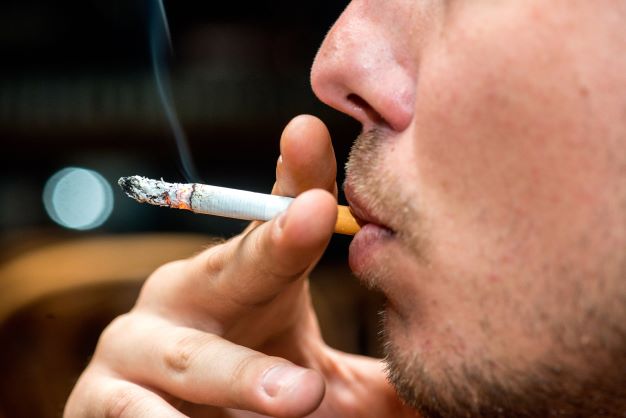Practicing good oral hygiene can go a long way in helping to protect your smile and keep your mouth healthy. Yet, no matter how often you brush or floss, certain habits can be damaging to your teeth. Smoking cigarettes is one of these habits and can cause a variety of problems that you’ll need to address at some point if you want to maintain a confident smile.
You’ve likely heard it before – smoking is bad for your health. What you might not realize is that the effect on your health starts in your mouth. As you take that first draw of a cigarette, it begins. From there, only so much can be done before you may see excessive teeth discoloration and also experience dental problems.
How Smoking Cigarettes Affects the Appearance of Teeth
Whether you smoke just a few cigarettes a day or an entire pack, the appearance of your teeth can go from pearly white to various shades of yellow then brown. Tooth discoloration can happen quickly, and you may be surprised one day when you glance at your smile in the mirror.
Cigarettes contain nicotine and tar. As you smoke, these two begin to seep into the tiny natural cracks in the porcelain-like enamel of your teeth. Even if you brush after each cigarette, the nicotine and tar are already settling into the cracks and causing staining. Such discoloration will continue as long as you smoke, affecting your appearance and the confidence in your smile.
How Cigarettes Affect Your Oral Health
The longer you smoke, the more you will begin to see issues with your teeth and gums. Tooth loss, in particular, is the biggest concern and can result from the development of decay and gum disease.
Tooth Decay
Smoking can lead to the build-up of tartar and plaque on your teeth. In turn, large cavities can form, and when they are located near the gumline, infection can result. The tooth begins to weaken and may become loose or break.
Gum Disease
Smoking tobacco products affects how the bone and soft tissue in your mouth attach, and it can interfere with the normal functioning of cells within gum tissue. As a result, you are at higher risk for infections and gum disease.
Gum disease is a major cause contributing to tooth loss. Smokers, in particular, experience a faster progression of gum disease, and this often results in more tooth loss. If you are concerned we can perform a screening for periodontal disease.
Signs you may be developing gum disease include the following:
- Bleeding whenever you brush or floss your teeth
- Swelling and redness in the gums
- Noticeable pulling away of gums from the teeth
- Sensitive or loose teeth
- Difficult chewing
Bone Damage or Loss
Untreated gum disease can push the infection into the bone and tissue, making it weaker. If so, you may, at some point, require restorative surgery.
Healing Process Delays
Smoking contributes to a delay in the healing process of the body, and this is troublesome for when you undergo tooth extractions, root canals, other oral surgeries, and periodontal treatments.
The body’s healing process requires an ample supply of oxygen. When you smoke, it reduces the oxygen levels in your bloodstream, providing less to help your body heal. Chronic smokers will heal even slower, and recovery times can stretch out.
Oral Cancer
Cigarette smoking increases your risk for developing cancer of the mouth, tongue, lips, and throat. The level of risk depends on how much you smoke and how long you have been smoking.
What You Can Do
While quitting is the preferable option when it comes to better oral health, we understand that it is not always as easy as it sounds. If you find it hard to quit, start by cutting back on the number of cigarettes each day, week, or month.
Set goals for yourself and find ways to distract yourself. Avoid the routines or places you associate with enjoying a cigarette. You may want to also consider attending smoking cessation classes or support group meetings.
How South Dayton Smiles Can Help
By scheduling regular dental cleanings and exams, your dentist can keep an eye on your oral health, diagnosing any issues early on. Your dental team will also talk with you about any discoloration and provide options to help you return to a whiter smile, such as with professional teeth whitening or veneers.
Your dentist can remove and treat the effects of tooth decay before it causes more damage. If you already have gum disease, it is often reversible with a deep cleaning treatment referred to as scaling and root planing. However, if you do end up losing teeth, your dentist can offer restorative solutions such as dental bridges, dentures, and crowns.
During each appointment, you’ll also undergo an oral cancer screening. This screening starts with your dentist examining your mouth and jaw for any irregularities. Imaging studies may come next, including digital X-rays, for a closer look at the tissues below the surface.
Find Out How South Dayton Smiles Can Help You Today
When it comes to your dental health, we are not here to lecture you about your smoking. Instead, the team at South Dayton Smiles will work with you to protect your smile and your overall oral health in the best ways possible. Call our office today or use the online contact form to schedule a consultation.

 Meet Dr. Botti
Meet Dr. Botti Meet Dr. Scranton
Meet Dr. Scranton
 Patient Forms
Patient Forms Online Bill Pay
Online Bill Pay Benefit Program
Benefit Program Your First Visit
Your First Visit